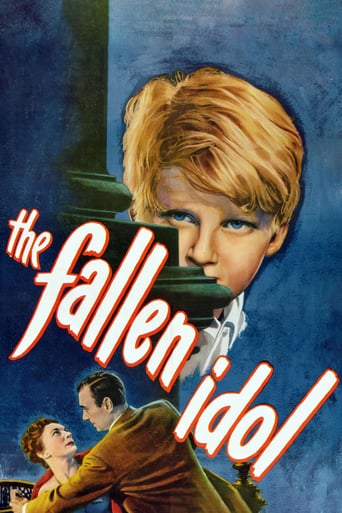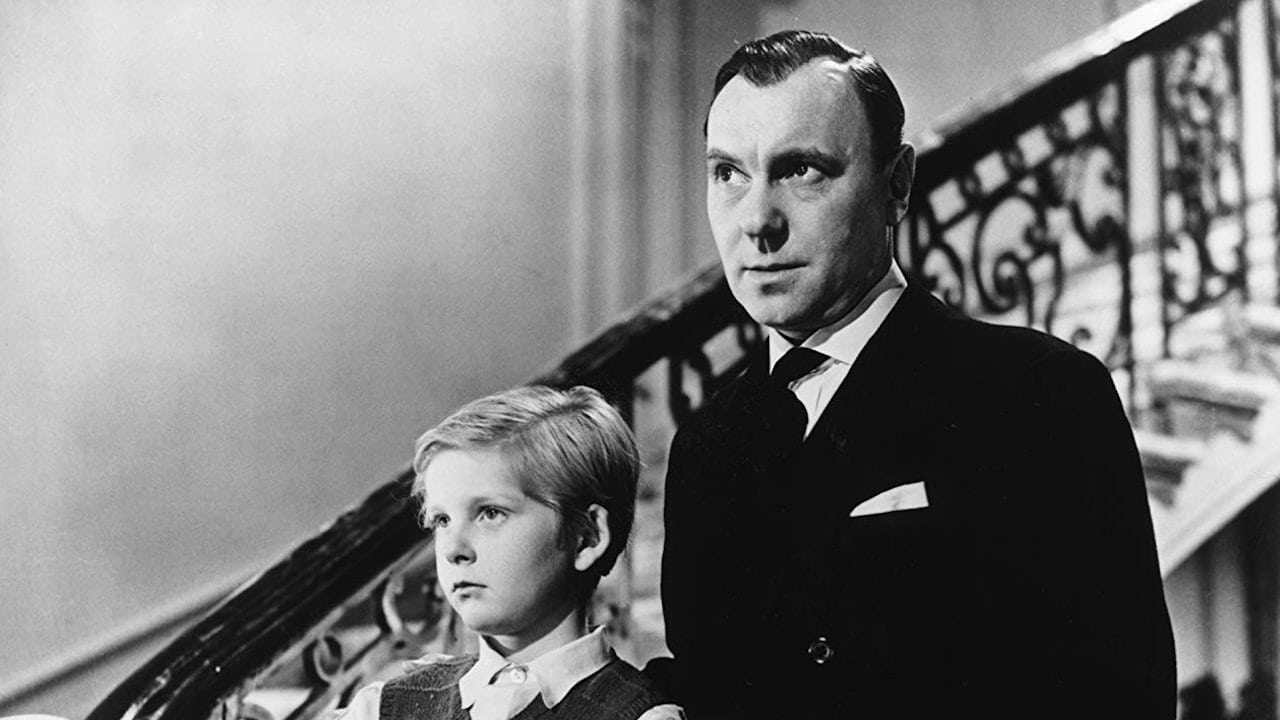morrison-dylan-fan
Shortly after watching director Carol Reed's very good,but sadly overlooked 1939 Pre-Code film A Girl Must Live,a fellow IMDb'er asked me if I had seen Reed's 1948 Film Noir The Fallen Idol.Despite the title being one of my dad's all time favourite films,and Reed's classic Spiv Film Noir The Third Man,and his high-kicking musical Oliver being two titles that I had greatly enjoyed,I had somehow never gotten around to taking a look at The Fallen Idol,which led to me putting the title at the top of my "must buy" list.A week later:Opening an unexpected parcel that had arrived earlier in the day,I was shocked to discover,that a very kind IMDb'er had sent me a surprise parcel containing not one,but two Carol Reed titles!,which led to me excitingly getting ready to at last witness the fall of an idol.The plot:Finding Phillipe being left on his own in the French embassy,as his parents go on a short holiday,loyal butler Baines decides to cheer Phillipe up,by telling him wild,made up stories,about his adventures in Africa.Looking less than amused at her husbands wild tales,and also not being particularly happy about Phillipe keeping a pet snake hidden,Mrs.Baines tells her husband that he should not be encouraging Phillipe with his crazy stories.Going past one of the main windows in the embassy a few days later,Phillipe notices Baines sitting in a near by café with a woman who is not his wife.Sneking out of the embassy,Phillipe rushes to the café,where he discovers Baines talking to a woman called Julie.With having a deep desire to see Julie, (who he has been having a long- term secret affair with) one last time before she has to go back to France,Baines invites Phillipe to come along with him and his "close friend" Julie to a trip to the zoo.Returning to the embassy later that night, (with Julie quietly creeping in,so as to not raise the attention of Mrs.Baines)Phillipe soon discovers that Baines new "friendship" will soon lead to him witnessing the horrifying sight,of his idol falling from grace.View on the film:Limiting any sense of genuine cheer to the oddly up-beat scored ending in his adaptation of his own short story The Basement Room,co-writer (along with Lesley Storm and William Templeton) Graham Greene gradually builds an unsettling Film Noir world,whose inhabitants turn out to be much different than they originally appeared.Keeping the plot based from a child's point of view,the writer's show Phillipe's "innocent" outlook on the adults to be one that is rotted away by the adults,with Philipe discovering,that instead of joy and optimism,the fractured face of the adults hide the dark shadows of deceit,dissolution,mistrust,and possibly,even murder.Fully displaying the low-lit world that Phillipe's embassy is enclosed in,director Carol Reed and cinematography Georges Perinal expertly use high-angle to show the darkness that surrounds the people in Philipe's life,from a height that Phillipe will never be able to reach.Along with the stylish high-angles,Reed also works closely with editor Oswald Hafenrichter to give the "fall" of Phillipe and "the idol" a tremendously gripping tension,with Reed using Hafenricter's snappy editing to show that a "murder" may not be what it originally appears to be.Despite being a bit of a pain to work with on set, (although this would not stop Reed from working with child actors in the future)Bobby Henrey gives an excellent performance as Phillipe,with Phillipe never being allowed to become a sickly-sweet character,thanks to Henrey showing Philipe's smile to slowly fade away as the "true" faces of the adults are revealed,which leads to Philipe's smile being replaced by a strong sense,of anger,confusion and disbelief.Joining Henrey,and backed by a wonderful supporting cast which includes a charmingly gruff Bernard Lee,Ralph Richardson gives an amazing performance as Baines,with Richardson complementing Henrey's performance by showing Baines to be someone who is deeply humble,but is also unable to stop the deadly mist which is stopping any light from entering his life,which Baines soon discovers stops him saving the fall of an "idol",that leads to Phillipe's childhood innocence being permanently decayed from the fallen idol.
Alex da Silva
Mr Baines (Ralph Richardson) and his wife (Sonia Dresdel) are left to look after a boy, Phillipe (Bobby Henrey) in a French Embassy house while the parents are away. Phillipe looks up to Mr Baines while disliking Mrs Baines, the housekeeper. He discovers Baines meeting up with another woman Julie (Michele Morgan) and is told to keep it a secret from Mrs Baines. However, she finds out with disastrous consequences...This film is well acted. Ralph Richardson gives a performance that holds back a little and is just on the right side of frustrating while my favourites in the cast are Sonia Dresdel and Dennis O'Dea who plays "Inspector Crowe". Scenes that stand out for me include the section where Mrs Baines is hiding in the house one night and we get a genuinely scary moment. I also found Inspector Crowe extremely watchable in his attempt to get the truth from Phillipe towards the end of the film and he delivers the wonderful line - "Will someone get this child out of here!" I found the film involved me gradually as it played out. The beginning was pretty mild and not very exciting as we focus on the rather annoying Phillipe with his strange accent. They should have cast someone else. However, the dialogue wins through at the end of the day and he gets some great lines, eg, when the police are in the middle of their investigation, he confides to Julie "we must think up more lies and keep telling them". Brilliant. And when he discovers that Mrs Baines has killed his pet "MacGregor", he puts forward the following as the epitaph for the burial - "MacGregor - killed by Mrs Baines - and the date". Genius.Another great quote comes when Dora Bryan who plays a prostitute called "Rose" is given the job of trying to find out who Phillipe is when he shows up at the police station.
pontifikator
An intelligent film from Carol Reed and Graham Greene, starring Ralph Richardson as the butler in the French embassy in London. The screenplay by Greene is based on his short story "The Basement Room," and the script is excellent, requiring some attention to catch all the details that are later lied about.The gist of the story is that young Phillipe (Bobby Henrey) is the only, lonely child of the ambassador, and he's taken under the wing of Baines, the embassy's butler. Baines fills the impressionable youngster with tall tales of derring do and shootings in the wilds of Africa. Phillipe adores Baines. Mrs. Baines (Sonia Dresdel), however, is a harridan and our villainess, requiring strict behavior from her ward.The problem is that Baines's tall tales take on a sinister aspect as we find out more about him and his relationship with his "niece." Baines is discovered by Phillipe who has no clue; at Baines's request, Phillipe agrees to keep the knowledge of the niece's existence secret. Based on the short story, I believe the boy is seven, but the actor was nine when the movie was made. In either event, Phillipe is no match for Mrs. Baines nor any other adult, so his attempt to keep his secrets are soon found out, and his attempts to protect Baines are branded as lies.Mrs. Baines, of course, meets her end in an accidental fall from a window ledge. However, it appears that Baines pushed her down the stairs, and the police are called to investigate. Phillipe lies to protect Baines, and the police soon find out about the niece and other goings on, which exposes Phillipe as a liar. It turns out that had everyone told the truth from the beginning, the suspicions would not have been aroused.Graham Greene is an excellent author, and I recommend his works. Since this is a Greene script, there are many turns of expectations and many amusing moments that are snuck in to take us unawares. (My favorite line: "Oh! I know your father, dear!") What makes this movie really work is the ending. Phillipe finally decides to tell the truth, but by doing so, he'll destroy Baines, although he doesn't know it. His attempts to get the police to listen to him are both tense and funny. It's a great ending to the movie. Greene also gets lots of characters in the movie in small parts; watch (and listen) for the charwomen and the clock winder. It's all very British.The movie was made in 1948 by the director of "The Third Man," which premiered the following year. Unlike Harry Lime's Vienna, Phillipe's London is untouched by war and corruption. (Both movies were scripted by Graham Greene and had two of the Korda brothers on the crew.) The camera work is great, and we get a wonderful view of (I think) Belgravia from the upper floors of the embassy. The movie is subtle, and attention is rewarded. The themes are adult, and the use of the child for perspective makes the movie work much better than a straight telling of an affair of the heart.The short story is considerably different from the film, and I recommend reading it after you've seen the movie. It's freely available online if you search for "The Basement Room." Phillipe has a much darker side in the story.
Michael Neumann
Before they made 'The Third Man', director Carol Reed and screenwriter Graham Greene collaborated on this mild-mannered suspense story, in which a precocious young boy's devotion to one of his father's servants is tested after he witnesses what appears to be his long-suffering idol pushing his wicked wife to her death down a flight of stairs. An investigation follows, but the film isn't really a mystery since the audience already knows more about what happened than any of the characters on screen. Truth will prevail, although the outcome is ambiguous: the police set matters straight, but they do so from a clue that has no connection to the suspected crime. If the film appears dated today it's only because they don't often make them of this high caliber anymore.


 AD
AD




